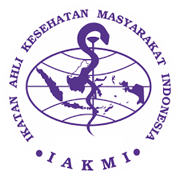FAKTOR-FAKTOR YANG BERHUBUNGAN DENGAN FOOD LOSS AND WASTE (FLW) BEHAVIOR PADA SEKTOR RUMAH TANGGA
Abstract
According to (Bernata, et.al 2020) pandemic conditions affect Indonesian food where there is an increase in food needs because people are encouraged to stay at home, besides that people are unable to get food because most people have to experience termination of employment so they have no income. Conditions during a pandemic like this require public awareness in reducing FLW habits. This study aims to determine the determinant factors that influence the incidence of FLW behavior during the Covid-19 pandemic in the household sector with a cross sectional approach, 100 household managers selected by simple random sampling technique and using correlation analysis. The results of the analysis of the relationship between knowledge p-value (0.004) and R (0.283), age p-value (0.402) and R (-0.085), education p-value (0.017) and R (-0,209), income from work p- value (0.078) and R (-0.177), shopping selection p-value (0.002) and R (0.300), number of family members p-value (0.785) and R (-0.28), choice of meal time p- value (0.001) and R (0.347), and health conditions p-value (0.002) and R (0.309).
Keywords
Full Text:
PDFReferences
Abdelradi, F. (2018). Food Waste Behaviour At The Household Level: A Conceptual Framework.Waste Management,71,485–493. https://Doi.Org/10.1016/J.Wasman.2017.10.001
Chalak, A., Abiad, M. G., Diab, M., & Nasreddine, L. (2019). The Determinants Of Household Food Waste Generation And Its Associated Caloric And Nutrient Losses: The Case Of Lebanon. Plos ONE, 14(12), 1–18. https://Doi.Org/10.1371/Journal.Pone.0225789
Cooper, K. A., Quested, T. E., Lanctuit, H., Zimmermann, D., Espinoza-Orias, N., & Roulin, A. (2018). Nutrition In The Bin: A Nutritional And Environmental Assessment Of Food Wasted In The UK. Frontiers In Nutrition, 5 (March). https://Doi.Org/10.3389/Fnut.2 018.00019
Di Talia, E., Simeone, M., & Scarpato, D. (2019). Consumer Behaviour Types In Household Food Waste. Journal Of Cleaner Production, 214, 166–172. https://Doi.Org/10.1016/J.Jclep ro.2018.12.216
Disya Sekolah Tinggi Pariwisata Trisakti, S. (2019). Consumer Behaviour With The Food Waste Issues. Jurnal Penelitian Komunikasi, 1(1), 95–105.
Martin, C. R. A. (1974). British Food Journal. British Food Journal, 76(4), 97–128. https://Doi.Org/10.1108/Eb011 699
Martindale, W., & Schiebel, W. (2017). The Impact Of Food Preservation On Food Waste. British Food Journal, 119(12), 2510–2518. https://Doi.Org/10.1108/BFJ- 02-2017-0114
Mattar, L., Abiad, M. G., Chalak, A., Diab, M., & Hassan, H. (2018). Attitudes And Behaviors Shaping Household Food Waste Generation: Lessons From Lebanon. Journal Of Cleaner Production, 198, 1219–1223. https://Doi.Org/10.1016/J.Jclep ro.2018.07.085
Barone, A. M., Grappi, S., & Romani, S. (2019). “The Road To Food Waste Is Paved With Good Intentions”: When Consumers’ Goals Inhibit The Minimization Of Household Food Waste. Resources, Conservation And Recycling, 149(May), 97–105.
Brandl, A., & Brandl, A. (2019). Food Waste In The Retail Sector An Analysis Of Drivers And Measures Food Waste In The Retail Sector An Analysis Of Drivers And Measures. February.
DOI: https://doi.org/10.47007/hp.v4i02.7354
Refbacks
- There are currently no refbacks.
Copyright (c) 2023 Health Publica
Lembaga Penerbitan Universitas Esa Unggul
Jalan Arjuna Utara No 9 Kebon Jeruk Jakarta 11510
Telp : 021 5674223 ext 266
View My Stats


2.png)






